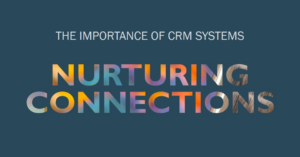Introduction:
In an increasingly competitive business landscape, building and maintaining strong relationships with customers is essential for long-term success. Customer Relationship Management (CRM) systems have emerged as powerful tools to help businesses manage interactions with customers, streamline processes, and drive growth. In this guide, we explore the importance of CRM systems in today’s business environment, highlighting their benefits and key functionalities for cultivating meaningful relationships and maximizing customer lifetime value.

1. Centralized Customer Data Management:
One of the primary benefits of CRM systems is their ability to centralize customer data from various sources into a single, comprehensive database. By aggregating data such as contact information, purchase history, interactions, and preferences, CRM systems provide a 360-degree view of each customer, empowering businesses to understand their needs, preferences, and behaviors more deeply. Centralized customer data management enables personalized communication, targeted marketing, and more informed decision-making across the organization.
2. Enhanced Customer Engagement:
CRM systems play a crucial role in enhancing customer engagement by facilitating personalized interactions and timely communication. With access to comprehensive customer profiles and historical data, businesses can tailor their messaging and offerings to each individual customer’s preferences and interests. Whether it’s sending targeted email campaigns, scheduling follow-up calls, or delivering personalized recommendations, CRM systems enable businesses to engage with customers in meaningful ways that resonate with their needs and preferences.
3. Improved Sales and Marketing Effectiveness:
CRM systems empower sales and marketing teams to work more efficiently and effectively by providing them with the tools and insights they need to succeed. Sales teams can track leads, manage pipelines, and prioritize opportunities more effectively, while marketing teams can segment audiences, track campaign performance, and measure ROI with greater precision. By aligning sales and marketing efforts and leveraging CRM data to inform strategies, businesses can drive more qualified leads, close deals faster, and maximize revenue generation.
4. Streamlined Business Processes:
CRM systems streamline and automate key business processes, reducing manual effort and increasing operational efficiency. From lead capture and qualification to order processing and customer support, CRM systems enable businesses to automate repetitive tasks, standardize workflows, and ensure consistency across the organization. By streamlining business processes, CRM systems free up time and resources that can be reinvested into more value-added activities, such as strategic planning, innovation, and customer service.
5. Data-driven Decision Making:
CRM systems provide valuable insights and analytics that empower businesses to make data-driven decisions and optimize performance. With built-in reporting and analytics tools, businesses can track key metrics, monitor trends, and identify opportunities for improvement. Whether it’s analyzing customer lifetime value, forecasting sales projections, or identifying upsell and cross-sell opportunities, CRM systems enable businesses to leverage data to make informed decisions that drive growth and profitability.
6. Scalability and Flexibility:
As businesses grow and evolve, CRM systems offer scalability and flexibility to adapt to changing needs and requirements. Whether you’re a small startup or a large enterprise, CRM systems can scale with your business and accommodate increased data volume, user count, and complexity. With cloud-based CRM solutions, businesses can access their CRM data anytime, anywhere, and easily integrate with other systems and applications to streamline operations and drive innovation.
Conclusion:
Customer Relationship Management (CRM) systems are indispensable tools for businesses looking to build and maintain strong relationships with customers, streamline processes, and drive growth. By centralizing customer data, enhancing engagement, improving sales and marketing effectiveness, streamlining business processes, enabling data-driven decision-making, and offering scalability and flexibility, CRM systems empower businesses to cultivate meaningful relationships and maximize customer lifetime value.
As you invest in CRM technology, remember that success ultimately comes down to how effectively you leverage CRM data and insights to drive customer-centric strategies and deliver exceptional experiences. By prioritizing customer relationships and leveraging CRM systems as strategic assets, businesses can differentiate themselves in the market, foster loyalty, and achieve sustainable growth in the long term.



